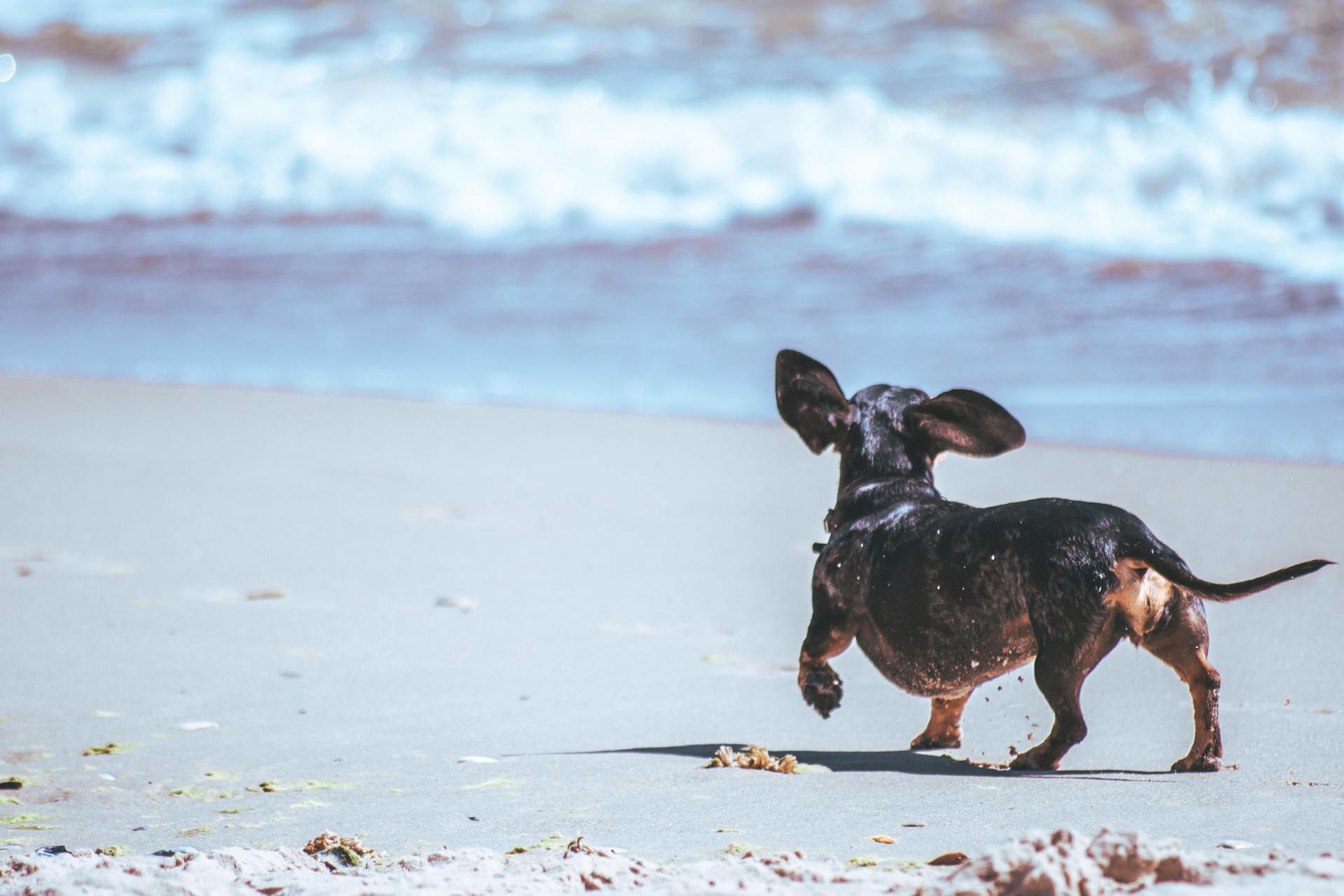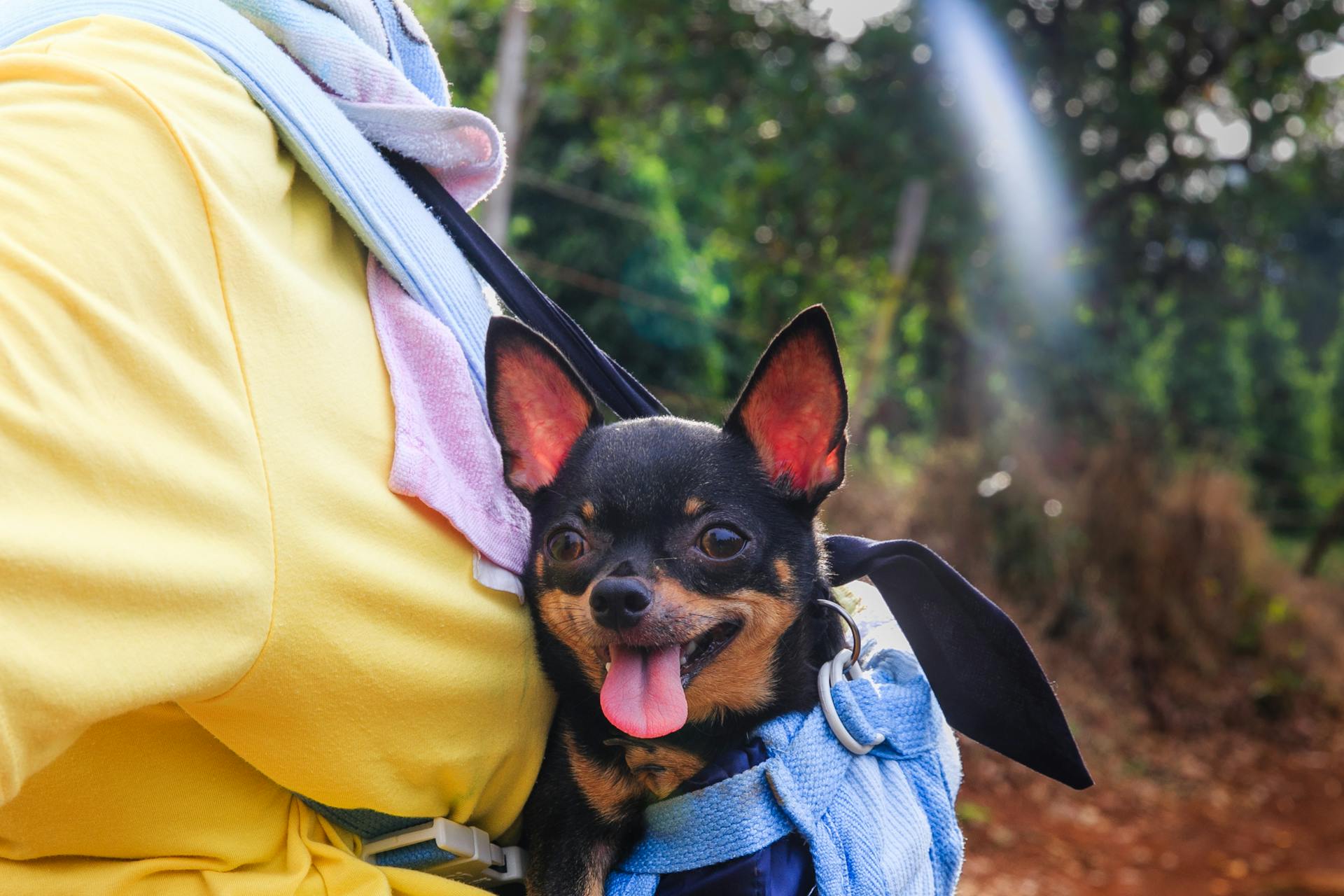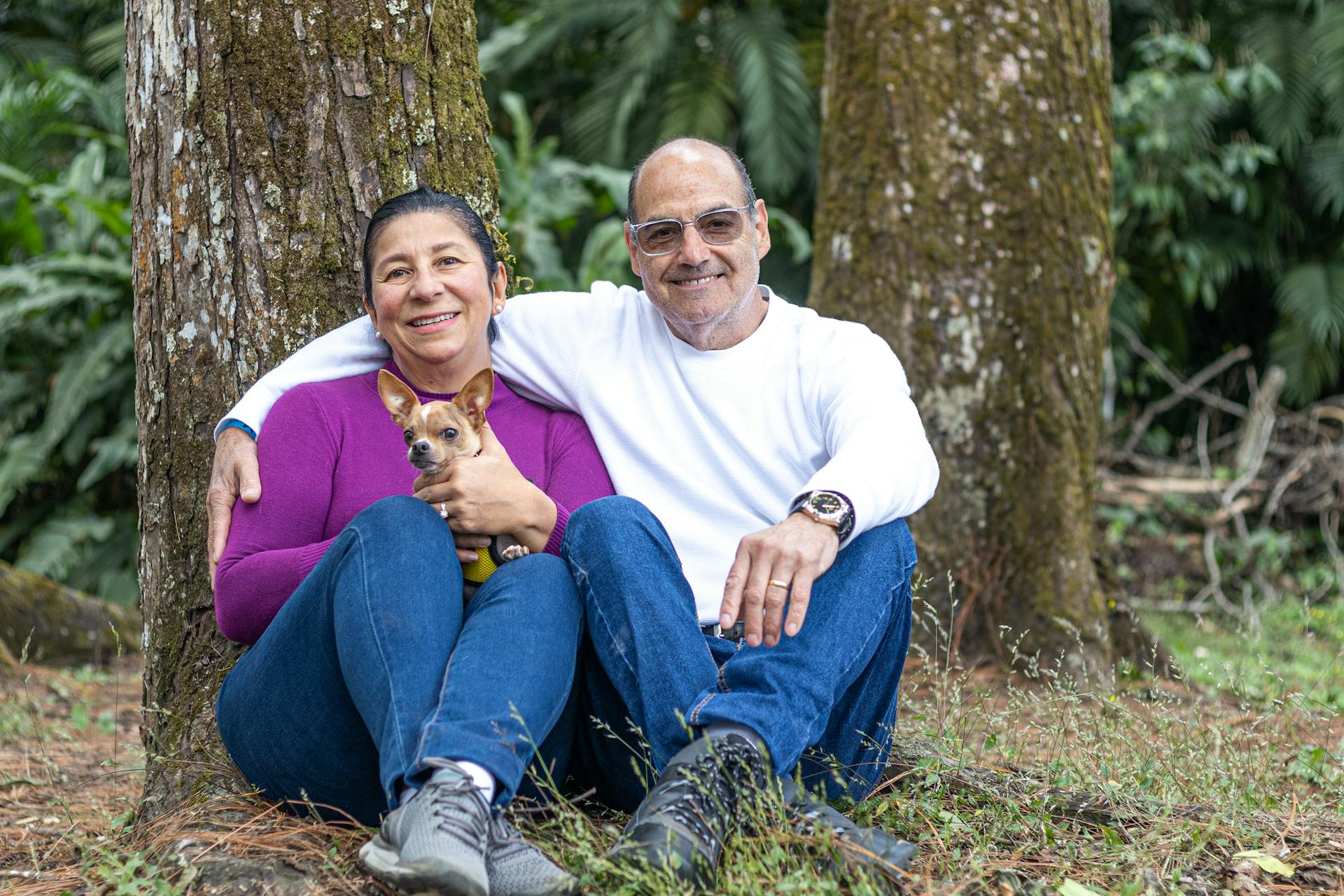
Chihuahuas are one of the smallest dog breeds, and their diet plays a crucial role in maintaining their small size and overall health.
To stay small and healthy, Chihuahuas need a high-quality, nutrient-rich food that is specifically formulated for their life stage and size.
A good starting point is to feed your Chihuahua a puppy food until they are about six months old, as this will provide them with the necessary nutrients for growth and development.
Chihuahuas also require a moderate amount of protein in their diet, with a minimum of 22% protein on a dry matter basis.
Discover more: Do Small Dogs Need Small Breed Food
Choosing a Diet
Choosing a diet for your Chihuahua can be a daunting task, but don't worry, I've got you covered. Consider choosing a dog food with small kibble size to minimize choking hazards and make eating easier for your pup.
For a Chihuahua's diet, it's essential to look for foods rich in omega-3 and other fatty acids. These can help reduce inflammation and stabilize blood pressure, which is a major risk factor for heart disease.
Some great sources of healthy fatty acids in dog food include salmon, cod, ground flaxseed, and chia seeds. You can find these ingredients in many dog foods specifically formulated for Chihuahuas.
When selecting a dog food, check for an AAFCO statement on the packaging. This indicates if the diet is "complete and balanced" for a particular life stage.
If your Chihuahua has specific medical conditions, it's best to consult with your veterinarian for personalized dietary recommendations. They can help you choose the ideal diet for your pup's unique needs.
Nutritional Requirements
Chihuahuas require a diet that's tailored to their small size and high metabolism.
A Chihuahua's daily calorie intake is minimal, possibly just 200 calories, depending on their size and activity level.
To ensure your Chihuahua gets the right balance of nutrients, look for pre-portioned, healthy meals that take into account their age, size, activity level, and weight.
A fresh food plan can help eliminate the guesswork of portion management and provide all the necessary nutrients in the right balance.
Here are some key nutritional requirements to keep in mind:
High-Quality Animal Protein
When it comes to protein, your dog's diet should consist of 18% protein and 5.5% fat, as recommended by the Association of American Feed Control Officials (AAFCO).
A high-quality animal protein is essential for your Chihuahua's diet. Look for main ingredients like turkey, chicken, fish, and lean beef, which are all great sources of protein.
Chihuahuas are prone to obesity and heart problems, so a lean animal protein will help promote a healthy weight.
Take a look at this: Is High Protein Dog Food Good for Dogs
Choose Rich in Omega-3 and Other Fatty Acids
Chihuahuas require a diet rich in omega-3 fatty acids to reduce inflammation and stabilize blood pressure. Research has shown that long-chain omega-3 fatty acids can help prevent heart disease in dogs.
In fact, inflammation is a major risk factor for heart disease, so choosing a food that's high in omega-3 and omega-6 fatty acids (as well as DHA) can make a big difference.
Some great sources of healthy fatty acids in dog food include salmon, cod, ground flaxseed, and chia seeds. These ingredients can promote a healthier skin and coat in Chihuahuas.
Here are some specific sources of omega-3 fatty acids you can look for in dog food:
- Salmon
- Cod
- Ground flaxseed
- Chia seeds
By incorporating these sources into your Chihuahua's diet, you can help support their overall health and well-being.
Feeding Options
For Chihuahuas, there are several feeding options to consider. Dry food is a popular choice, as it's easy to store and can help maintain dental health by reducing plaque build-up.
However, some owners find it less palatable than wet food. A raw diet, on the other hand, involves feeding uncooked meat, bones, fruits, and vegetables, but it requires careful planning and preparation to ensure it's nutritionally balanced.
Whole Grain Chicken Clusters for Small Breeds is a convenient and delicious option specifically crafted for small dogs, featuring a tiny cluster size that's easy for Chihuahuas to chew.
You might like: Are Chihuahuas Easy to Train
Best for a Small Breed
When choosing a food for a small breed like a Chihuahua, consider their small mouths and teeth. Larger kibble can be difficult for them to swallow and digest.
Opt for a dog food with small kibble size, designed specifically for small breeds. This will minimize choking hazards and make eating easier for your pup.
Readers also liked: Why Are Chihuahuas so Small
Whole grain chicken clusters are a convenient and delicious option for small breeds. They're available in various bag sizes, including 1-, 4-, and 10-pound bags.
Some dog foods are specifically crafted for small breeds, featuring tiny cluster sizes that are easy to chew. Look for these types of foods to make mealtime a breeze for your Chihuahua.
Limited ingredient fish dog food is another great option for small breeds. It's made with lean fish as the main ingredient and is gentle on sensitive stomachs.
Here are some key ingredients to look for in a healthy dog food for small breeds:
- Cage-free chicken
- Oats
- Barley
- Chicken liver
- Ground flaxseed
- Eggs
- Broccoli
- Pumpkin
- Apples
These ingredients are great sources of healthy carbohydrates and provide essential nutrients for small breeds.
Wet
Wet food is a great option for dogs, especially Chihuahuas, as it's often more palatable for them and can be easier to eat, even for those with dental issues.
It's also worth noting that wet food can aid hydration, thanks to its high water content.
Wet food can be pricier than dry food, which may be a consideration for some pet owners.
Additional reading: How to Make Dog Treats from Wet Food
Dry
Dry food, also known as kibble, is a popular choice for many dog owners.
It's easy to store and has a longer shelf life compared to wet food.
Some dogs might find it less palatable than wet food, so it's worth considering their individual preferences.
Dry food can help maintain your Chihuahua's dental health by reducing plaque build-up.
This is especially beneficial for Chihuahuas with dental issues, as they may struggle with eating dry food.
However, it's worth noting that dry food can be pricier than wet food in some cases.
Additional reading: Is Wet Food Better for Dogs
Raw Diet
A raw diet involves feeding your dog uncooked meat, bones, fruits, and vegetables, which some believe is a more natural diet for them.
Supporters of raw feeding require careful planning and preparation to ensure the diet is nutritionally balanced.
When to Switch Puppy to Adult Food
Switching your Chihuahua puppy to adult food is a significant milestone in their growth and development.
Chihuahua puppies don't stop growing until they reach 9 to 12 months of age, so it's essential to wait until then to switch to adult food.
On a similar theme: Can You Feed Adult Dogs Puppy Food
Adult dog foods can be deficient in protein and other essential nutrients, which is why it's crucial to stick to a high-quality puppy food until your Chihuahua is fully grown.
By waiting until your Chihuahua is between 9 to 12 months old, you'll ensure they get the nutrients they need to thrive and develop into a happy and healthy adult dog.
How Often?
Chihuahua puppies require more frequent feedings as their stomachs are smaller and they burn energy quickly.
Typically, a Chihuahua puppy feeding guide recommends feeding three to four times a day, gradually reducing to two times a day as they approach adulthood.
Feeding your Chihuahua four to six times a day until they are about three months old is a good starting point.
As Chihuahua puppies grow, their feeding schedule can be gradually reduced to three to four meals a day, and eventually to two to three meals a day for adult Chihuahuas.
See what others are reading: 2 Chihuahuas
Adult Chihuahuas can be fed two to three meals a day, with a recommended schedule of feeding twice a day - once in the morning and once in the evening.
Consistency is key, so find a schedule that aligns with your day-to-day activities to ensure your Chihuahua's feeding times are consistent and reliable.
Regular feeding times can help regulate your Chihuahua's digestion and maintain a healthy metabolism, making it easier to manage their overall health and wellbeing.
For another approach, see: Havanese Feeding Chart
Special Considerations
Feeding your Chihuahua requires special considerations, especially if they have food sensitivities or specific dietary needs.
Chihuahuas with food sensitivities may experience discomfort, so it's essential to consult with a veterinarian to establish a suitable diet plan.
Some dogs may need specially formulated food to support optimal digestion and nutrient absorption, which can include food with probiotics or high fibre content.
Chihuahuas with skin or coat problems can benefit from a diet rich in omega fatty acids, which promote a healthy skin and glossy coat.
For optimal health, Chihuahua puppies should be fed a food that meets AAFCO guidelines for either "Growth" or "All Life Stages".
You might enjoy: What Food Is Good for Dogs Skin and Coat
Should You Get a Puppy?
Getting a puppy can be a thrilling experience, but it's essential to consider the costs involved. The average cost of owning a dog for the first year is around $1,500.
Puppies require a lot of time and attention, especially during the first few months. They need to be trained, socialized, and taken care of several times a day.
Their small size can be deceiving, as puppies can be destructive if left unattended. A puppy can chew through a pair of shoes in under a minute.
Regular veterinary check-ups are crucial for a puppy's health, with an average cost of $500 per year. This includes vaccinations, parasite control, and other necessary treatments.
If you have young children, it's essential to consider their age and ability to interact with a puppy safely. Children under the age of 6 should not be left alone with a puppy.
Puppies can be a great addition to a family, but they do require a significant amount of space. A small apartment might not be the best fit for a high-energy breed.
Their short lifespan can be a difficult reality to face, but many breeds can live up to 15 years or more with proper care.
Related reading: Are Chihuahuas Good for First Time Owners
Do They Need Special Care?
Chihuahuas may require special care depending on their age, with puppies needing a diet that meets AAFCO guidelines for either "Growth" or "All Life Stages" to ensure optimal health.
Puppies need a special diet to support their growth and development, so it's essential to choose a high-quality puppy food that meets their nutritional needs.
As they grow, Chihuahuas may develop food sensitivities, which can cause discomfort and should be addressed with the help of a veterinarian.
A veterinarian can help determine the best diet plan for a Chihuahua with food sensitivities, and it's crucial to establish a suitable diet plan to avoid any adverse effects.
Chihuahuas with skin or coat problems may benefit from a diet rich in omega fatty acids, which promote a healthy skin and glossy coat.
Senior Chihuahuas may benefit from a recipe made for seniors, which can help support their specific nutritional needs as they age.
It's essential to consult with a veterinarian to determine the best diet plan for a senior Chihuahua, as they may require different nutrients and supplements to maintain their overall health.
What Happens If I Overmedicate My Dog?
Overmedicating your dog can have serious consequences. Weight gain is the result of overmedicating, similar to overfeeding a chihuahua. Obesity has been associated with major diseases in dogs, including diabetes and arthritis.
Overmedicating can also lead to liver and kidney damage. The right dosage and frequency of medication are crucial to avoid these complications. Always consult with your veterinarian to determine the correct dosage for your dog.
Product Reviews and Recommendations
If you're looking for the best food for your Chihuahua, consider their small stomach size and high metabolism, which means they need to eat frequently.
A good quality puppy food can support their growth and development, and a nutrient-rich adult food can help maintain their overall health.
Some popular dog food brands for Chihuahuas include Hill's Science Diet and Royal Canin, which cater to their specific nutritional needs.
The Honest Kitchen
The Honest Kitchen is a brand that stands out for its commitment to using human-grade ingredients in its dog food products. Their foods are made with the same quality ingredients and regulatory standards as the healthy foods you buy for yourself.
All of their foods are designed to meet the specific nutritional needs of little dogs like Chihuahuas. They offer a range of options to suit your pup at all life stages, from puppyhood to adulthood.
Their products are suitable for Chihuahuas, and they cater to their unique needs.
A unique perspective: Bichon Frise Foods to Avoid
Why It's Great

This recipe is ideal for small breeds because it's gently processed into a small kibble size.
The first ingredient is cage-free chicken, a lean protein source that's perfect for your pup's diet.
Flaxseed is an excellent source of fatty acids that support heart health in dogs.
Dogs love the delicious flavors of real fruits and veggies in this recipe, making mealtime a treat.
This human-grade recipe contains only what your pup needs and nothing that they don't, giving you peace of mind as a pet owner.
Health and Wellness
Chihuahuas require a balanced diet to stay healthy, which includes quality proteins for muscle development and carbohydrates for energy. A well-balanced diet is crucial for their overall health.
Nutrients like fats are essential for skin and coat health, and vitamins and minerals support various bodily functions. Always refer to a feeding chart to ensure you're offering the correct portions.
Chocolate, onions, grapes, and some artificial sweeteners like xylitol are potentially dangerous foods that can be harmful or even fatal to dogs. Be cautious of these ingredients in your Chihuahua's food.
Regular exercise is essential to keep your Chihuahua fit and healthy, and daily walks, playtime, or interactive games can help maintain their physical health and mental stimulation. Tailor activities to your Chihuahua's age and overall health status.
Regular vet check-ups are important to monitor your Chihuahua's health and catch any potential problems early on. Your veterinarian can provide valuable advice on feeding, exercise, and overall care.
Suggestion: Do Chihuahuas Need a Lot of Exercise
Frequently Asked Questions
What can Chihuahuas eat besides dog food?
Chihuahuas can safely eat cooked potatoes, sweet potatoes, lean meats, and pureed pumpkin as occasional treats, but always consult with your veterinarian before introducing new foods to their diet
What foods can Chihuahuas not eat?
Chihuahuas should avoid eating chocolate, grapes, raisins, onions, garlic, xylitol, and raw bread dough to ensure their safety and health. Read on to learn more about these toxic foods and how to keep your furry friend safe
Sources
- https://www.hypropremium.com.au/chihuahua-feeding-guide/
- https://www.thefarmersdog.com/digest/chihuahua-care-guide-food-exercise-personality/
- https://www.thehonestkitchen.com/blogs/pet-food-ingredients/best-dog-food-for-chihuahua
- https://www.dogfoodadvisor.com/best-dog-foods/chihuahuas/
- https://www.raisedrightpets.com/blog/how-much-should-a-chihuahua-eat/
Featured Images: pexels.com


